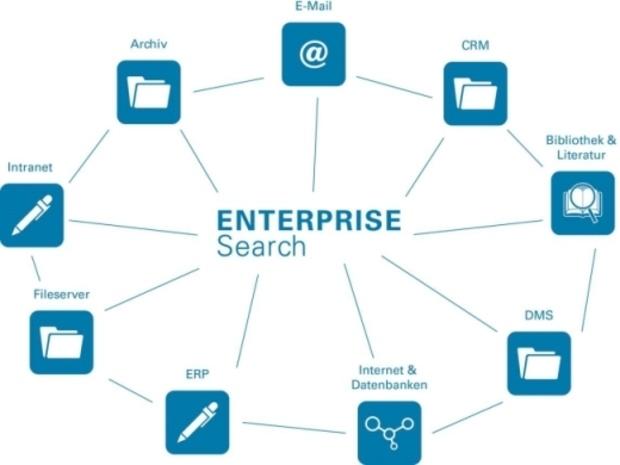Enterprise Search: Enabling Users to Find Information Fast

As the volumes of data in enterprises continue to grow exponentially due to digitization of records and processes, finding the right information at the right time has become a major challenge. With data spread across multiple systems, applications and repositories, it is increasingly difficult for users like employees, partners and customers to discover relevant information that can help them make informed decisions and take necessary actions quickly. This is where enterprise search comes into play by providing a unified search experience across the entire organization.
What is Enterprise Search?
Enterprise search refers to deploying search capabilities across an entire organization to index and search through both structured and unstructured data from multiple internal and external sources. The goal is to deliver a simple, intuitive and fast search experience for users to discover knowledge and insights stored in the organization’s vast volumes of documents, emails, customer records, product information and more.
Unlike consumer search engines designed for public web search, enterprise search solutions are tailored to work within the firewalls of a company and integrate with its existing IT infrastructure, databases, applications and security protocols. They comprehensively crawl and index both public and private sources of information owned by the enterprise to offer search and discovery services to authorized users.
Key Benefits of Enterprise Search
Having a centralized enterprise search platform brings significant benefits across departments by improving productivity, boosting revenues and reducing costs. Some of the key advantages include:
- Improved User Experience: Employees, partners and customers can easily search across all internal and external sources of information from a single search box to find relevant results fast without having to check multiple discrete systems and applications separately. This enhances productivity and the overall user experience.
- Reduced Information Silos: By eliminating information silos, enterprise search breaks down barriers between departments and functions to facilitate collaboration and sharing of knowledge across the organization. It connects users to pertinent data and insights wherever located.
- Increased Revenues: Better search capabilities help organizations improve customer service levels and experiences. Customers can easily search FAQs, support documents, past orders and interactions to find solutions to their queries quickly. This boosts customer satisfaction, retention and revenues over time.
- Accelerated Decision Making: Key decision makers across C-suites and functions can fast discover strategic insights buried in enterprise data through an intuitive search interface and decide better in a time-bound manner. This leads to competitive advantage.
- Data Governance and Compliance: Enterprise search solutions plug data leaks and ensure access to sensitive information adheres to compliance and regulatory guidelines. They authenticate users and apply granular access controls based on roles.
Popular Deployment Models
There are primarily three ways organizations deploy enterprise search:
On-premises: The traditional deployment is to install hardware and software search components at the company premises behind the firewall. This provides full control but maintenance can be costly.
Cloud-based: As cloud technologies advanced, many enterprises have migrated search to the cloud for its scalability, flexibility and pay-as-you-go pricing. However, some data security concerns remain.
Hybrid: For maximum benefits, a hybrid model combining on-prem and cloud deployments based on the sensitivity and usage of the data indexed is gaining popularity. Public/non-sensitive data resides in the cloud while private data remains on-prem.
Key Components of an Enterprise Search Solution
A robust enterprise search system consists of the following core components:
- Web Crawlers: Intelligent bots that traverse internal networks, websites, desktops, databases and directories to index content from both structured and unstructured sources.
- Indexers: They extract metadata, keywords and other semantic attributes from collected content to normalize it for unified searching later. Special natural language processing techniques are used to understand concepts in documents.
- Search Servers: High-powered servers running specialized search software infrastructure that store indexed data and process complex search queries at scale from users.
- Query Analyzers: They analyze user search terms, interpret intents behind queries and expand keywords to return most relevant results with the help of machine learning and linguistic analysis technologies.
- Relevancy Rankers: Components that determine the importance of search results and dynamically rank them in the most applicable order based on semantic relevance, user profile and context.
- Reporting Dashboards: Dashboards that provide detailed analytics on search patterns, top queries, trends over time, user behavior, unused resources and content gaps to optimize the search deployment.
Selecting the Right Enterprise Search Vendor
As technological capabilities in search evolve rapidly, choosing an enterprise search platform compatible with an organization’s industry, infrastructure, budget and future roadmap is critical. Key factors in shortlisting potential vendors include:
- Industry expertise and customizable solutions for specific verticals like healthcare, manufacturing, retail etc.
- Strong integration capabilities with existing apps, portals, databases and systems used in the organization.
- Scalability to handle terabytes or petabytes of data and millions of searches each month.
- Advanced features like query understanding, dynamic clustering, personalization, spell checking etc.
- Robust security, access control, authentication and audit functionalities.
- Ongoing support, upgrades and training to optimize use of the search platform.
- Competitive and flexible pricing and payment models.
- Case studies and references from similar organizations with metrics around ROI and impact.
This brings us to the conclusion that enterprise search done right can significantly boost productivity, collaboration, revenues and decision making across organizations by empowering users to find trusted information from within mountains of enterprise data with lightning speed through an intuitive search experience. It is a worthwhile transformation for enterprises looking to maximize returns from their digital assets.
Get more insights on this topic: https://www.newsanalyticspro.com/enterprise-search-fueling-business-growth-in-the-digital-era/
Explore more information on this topic, Please visit: https://captionssky.com/mineral-wool-a-new-rise-in-building-and-construction-industry/
- Art
- Causes
- Crafts
- Dance
- Drinks
- Film
- Fitness
- Food
- Games
- Gardening
- Health
- Home
- Literature
- Music
- Networking
- Other
- Party
- Religion
- Shopping
- Sports
- Theater
- Wellness
- IT, Cloud, Software and Technology


